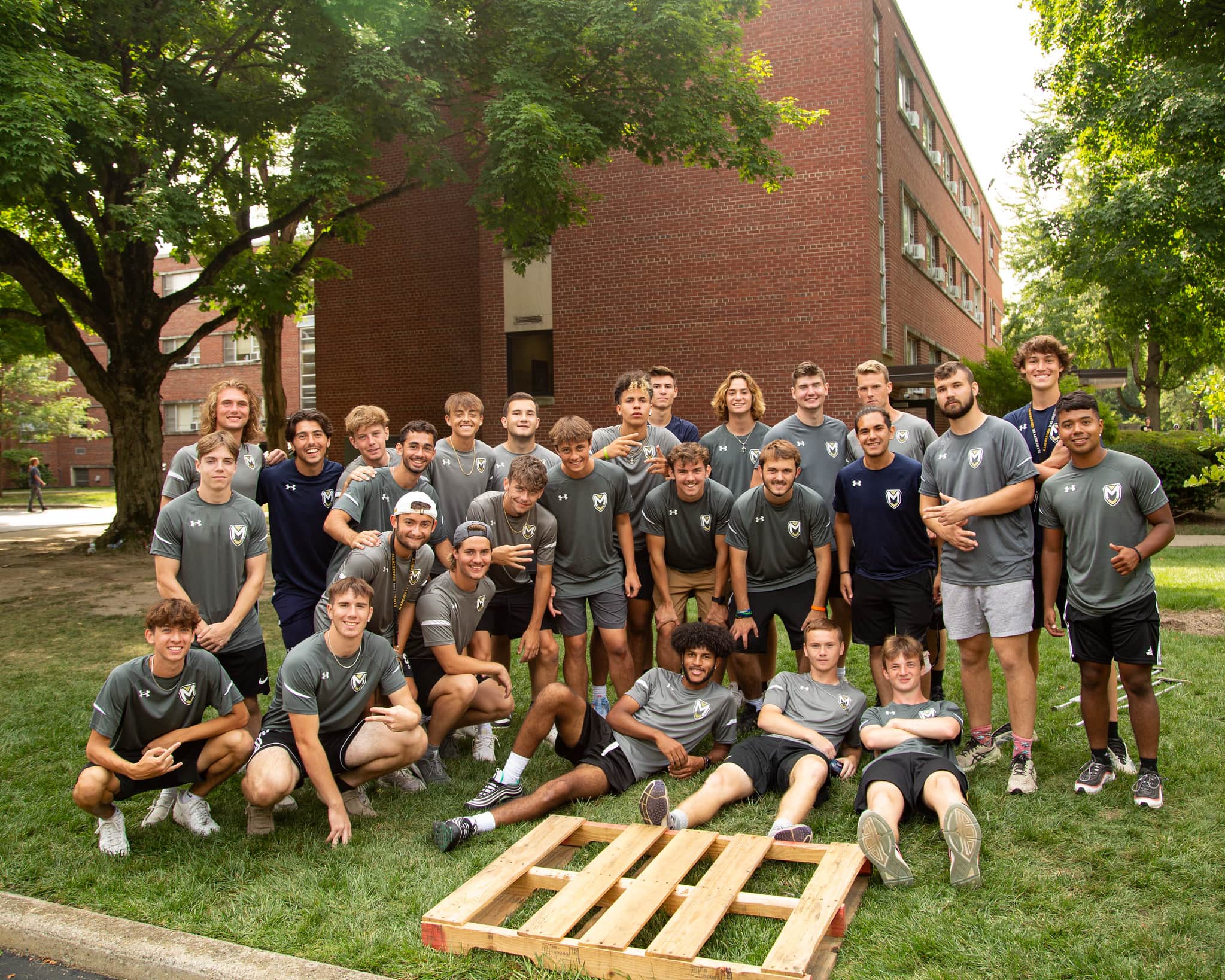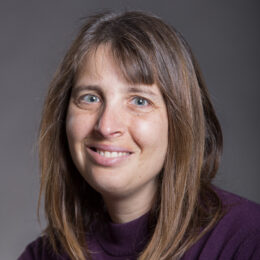Software Engineering
Build the future with a software engineer degree from Manchester University. Through our Mathematics and Computer Science department, you’ll master programming, design resilient systems, and complete real-world projects that prepare you for success in fields like AI, app development, cloud computing, and data science.

Launch Your Tech Career with a Software Engineer Degree
Manchester University’s software engineer degree program—offered through the Marvin L. Bittinger Department of Mathematics and Computer Science—prepares students to thrive in today’s technology-driven economy. Rooted in both theory and applied problem-solving, the program goes beyond coding to cover essential topics such as software architecture, data structures, system analysis, cloud computing, and user interface design. Whether you’re drawn to AI, mobile app development, cybersecurity, or video game design, this degree equips you with the tools, languages, and real-world experience to succeed. You’ll learn key programming languages like Python, C#, and SQL while completing internships and building software systems that solve real-world problems. With a strong focus on software quality, ethics, and system design, this program positions graduates to innovate in every corner of the tech industry.
Program Information:
- 51 Credit Hours
Location
- North Manchester
Why Choose MU for a Degree in Software Engineering?

Expert Faculty Mentorship
Real-World Project Experience
Career-Ready Skill Set
What You Can Do With Your Software Engineering Degree
Software Designer
Create and develop scalable applications for web, desktop, or mobile.
Mobile Application Developer
Design intuitive mobile apps across platforms like iOS and Android.
Robotics Engineer
Build and program intelligent machines to solve real-world challenges.
Database Analyst
Manage, optimize, and secure organizational data for maximum efficiency.

Average Starting Salary for Software Engineer Degree Holders
Graduates with a software engineer degree enter a high-demand field with strong earning potential. According to the U.S. Bureau of Labor Statistics, the median annual wage for software developers was $132,930 in 2022. Entry-level roles typically start between $70,000 and $90,000, depending on location, industry, and specialization. The field is projected to grow 22% through 2030—much faster than average—making it a smart investment for long-term career stability and financial success in today’s tech-driven economy.

How the Software Engineering Program Supports Your Growth
Programming Skills That Matter
Senior Project or Internship: Your Capstone Experience
Manchester University’s Software Engineering program culminates in a significant capstone requirement that integrates academic learning with real-world application. Students fulfill this through either a Senior Project or an Internship, both of which include substantial writing and a public presentation.
Internship Track (CPTR 477)
Students choosing the internship path gain hands-on experience in a professional setting relevant to software engineering. You must:
- Secure and propose an approved internship.
- Complete at least 8 weeks of supervised work.
- Register for CPTR 477 for three credit hours.
In addition to the internship, students must:
- Keep a journal.
- Write a technical paper addressing what was learned and how it applies to software engineering.
- Give a 35–40 minute presentation to department faculty and students.
Evaluation:
- Paper (40%)
- Presentation (20%)
- Employer report (30%)
- Faculty advisor assessment (10%)
- A passing grade (C– or better) is required on both the paper and presentation to meet the Senior Comprehensive Evaluation (SCE).
Senior Project Track (CPTR 499)
For those interested in deeper academic inquiry or software creation, the Senior Project offers a self-directed opportunity. Projects may involve:
- Software system development.
- Theoretical research.
- Software analysis or architecture design.
You must:
- Choose a topic and advisor.
- Register for CPTR 499 for three total credits.
- Complete background research, a requirements document, and either a prototype or design specifications.
- Implement your solution and test it.
- Write a comprehensive report and present your work to the department.
Evaluation:
- Paper (40%)
- Presentation (20%)
- Mastery of topic (20%)
- Professionalism (20%)
As with the internship, passing both the paper and presentation is required for SCE completion.
Key Deadlines & Timetable
Internship Timeline:
- Junior Year, Spring – Secure and get internship approved.
- Summer Before Senior Year – Complete internship, begin paper.
- Senior Year, Fall Week 4 – Submit final paper.
- Senior Year, Fall Week 5 – Deliver department presentation.
Senior Project Timeline:
- First Semester – Research, develop requirements, possibly build a prototype.
- Second Semester – Design, implement, test, and write final paper.
- By Week 13 – Deliver presentation.
- End of Semester – Submit paper and program code for departmental records.
These culminating experiences challenge students to synthesize their education into a meaningful, portfolio-worthy outcome—bridging classroom concepts with professional competencies in the field of software engineering.
Add Depth with Minors in Computer Science or Systems Analysis
Students majoring in Software Engineering at Manchester University can expand their expertise with minors in Computer Science or Systems Analysis, both housed in the Marvin L. Bittinger Department of Mathematics and Computer Science.
The Computer Science minor enhances your technical foundation with coursework focused on programming, algorithms, and the mathematical principles that power modern computing. It’s ideal for students who want a stronger theoretical base or are considering advanced studies in computing.
The Systems Analysis minor is designed for students who want to apply software engineering in a business context. This program blends courses in computer science and business systems to prepare students for roles in IT consulting, systems architecture, or enterprise software development. You’ll explore how technology supports business operations—and how to improve those systems through thoughtful design and implementation.
Both minors allow Software Engineering students to customize their education, increase marketability, and open doors to broader career paths—from technical development to business-oriented technology roles.
Technology
Manchester University’s commitment to technology ensures that Software Engineering students have access to advanced tools, dedicated lab space, and campus-wide connectivity that supports both coursework and innovation.
The Marvin L. Bittinger Department of Mathematics and Computer Science provides exclusive access to a private computer lab (SCIC 123) for software engineering and mathematics majors. This space includes seven high-performance workstations, a 3D printer, and a Raspberry Pi lending library—offering hands-on experience with development hardware and prototyping tools.
Beyond department-specific labs, Manchester maintains multiple computing environments across campus, including large labs in the Clark Computer Center, Funderburg Library, and the Science Center. Each residence hall also includes a dedicated computer lab, ensuring students have 24/7 access to digital resources.
Technology is refreshed regularly on a replacement cycle to keep systems current, and campus-wide wireless connectivity supports remote collaboration and cloud-based development work. Whether you’re coding a machine-learning algorithm or presenting your senior project, you’ll have the tools and infrastructure you need to succeed.
Student Groups and Campus Involvement
You can join clubs that promote coding challenges, programming competitions, and project-based learning—often hosting events like hackathons, alumni panels, and guest speakers from the tech industry. These groups provide excellent opportunities for leadership development, networking, and portfolio building beyond the classroom.
Additionally, students frequently collaborate on interdisciplinary initiatives that integrate software engineering with other areas such as data science, mathematics, and business systems. Whether it’s building a mobile app for a campus event or contributing to open-source projects, involvement in these groups offers real-world practice and career-ready experience.
Manchester’s welcoming and tight-knit campus culture ensures you’ll find mentorship, peer support, and a strong sense of community as you pursue your software engineer degree.
Co-Curricular Activities
Students in the Software Engineering program can enrich their learning through a variety of co-curricular activities offered by the Marvin L. Bittinger Department of Mathematics and Computer Science. These organizations provide opportunities for leadership, scholarship, and connection with others who share a passion for technology and problem-solving.
Kappa Mu Epsilon is a national mathematics honor society that promotes academic excellence and provides a platform for students to present research, collaborate with faculty, and engage in professional development events.
Students Pondering About Mathematics (SPAM) is a fun and informal group that brings together students to explore creative mathematical concepts through puzzles, games, and group discussions.
Computer Science Club offers hands-on experience with coding, app development, and collaborative projects. Members participate in coding competitions, workshops, and tech-focused campus initiatives—helping students build both their portfolios and peer networks.
These co-curricular opportunities strengthen the software engineer degree experience and connect students with like-minded peers across disciplines.
Links and Resources
Students pursuing a software engineer degree at Manchester University benefit from a wealth of academic and professional resources curated by the Marvin L. Bittinger Department of Mathematics and Computer Science. These tools help support your transition from undergraduate coursework to research, internships, and long-term careers in software development, computer science, and mathematics.
Key Support Areas Include:
- Professional associations in computing, statistics, and mathematics (e.g., ACM, IEEE, MAA, ASA)
- Career preparation tools and internship databases for math and tech majors
- Job boards and fellowships from organizations like the Census Bureau, AT&T, and the Peace Corps
- Research opportunities such as NSF’s Research Experiences for Undergraduates (REUs)
- Graduate study resources and academic databases like MathSciNet
From academic growth to career planning, these curated resources ensure Manchester’s software engineering students have the tools they need to thrive—both during college and beyond.
Mathematical, Computational & Engineering Sciences Department
Requirements and Courses
The Bachelor of Science in Software Engineering at Manchester University requires 49–51 credit hours, including foundational coursework in computer science, data science, and mathematics.
Key courses include:
Core Software Engineering Courses:
CPTR 111, 113, 231, 310, 340, 342, 420, 422
Supporting Courses:
DATA 231, IDIV 205, MATH 125, MATH 130
Capstone Requirement:
3 hours from either CPTR 477 (Internship) or CPTR 499 (Senior Project)
Electives (6+ hours):
Choose from CPTR 308, 410, 424, 430; or MATH 315
Students can also pursue related minors in Computer Science (24–26 credit hours) and Systems Analysis (27–29 credit hours).
Course topics include mobile app development, cloud computing, machine learning, database design, algorithms, architecture, and software quality. Several courses carry a “W” designation, indicating writing-intensive experiences.
Meet the Faculty
You Might Also Be Interested In These Programs

Frequently Asked Questions About the Degree in Digital Media
What can I do with a software engineer degree?
Manchester University’s software engineering program trains students in industry-relevant languages like Python, C#, and SQL, while offering coursework in cloud computing, machine learning, database management, and mobile application development. These technical skills are crucial for building and maintaining software systems across various industries—from healthcare and finance to entertainment and manufacturing.
The program also emphasizes critical thinking and project-based learning, culminating in a capstone experience that includes either a senior project or an internship. These experiences help students develop software solutions for real-world challenges and build a strong portfolio.
In addition to entering the workforce, many graduates pursue advanced study in areas like data science, artificial intelligence, or computer engineering. Whether your goal is to launch a startup, work in computer systems design, or contribute to open-source platforms, this software engineering degree prepares you for a thriving career in one of today’s most in-demand fields.
Is software engineering a good major?
Manchester University’s software engineering program offers hands-on experience in developing real-world software applications, from mobile apps to embedded systems. Students master programming languages like Python, C#, and SQL while exploring advanced topics such as software quality, machine learning, and cloud computing.
The degree also builds skills in teamwork and communication, helping students excel in collaborative environments where user interface design, data structures, and the software development life cycle play key roles. Software engineering jobs require both theoretical knowledge and practical skills—both of which are embedded in Manchester’s academic program.
Whether you want to work in web and mobile applications, artificial intelligence, or enterprise software development, a software engineering degree provides flexibility, financial stability, and opportunities for leadership and innovation.
What is the difference between software engineering and computer science?
Software engineering, by contrast, applies engineering principles to the design, development, and maintenance of software systems. The software engineering program at Manchester University emphasizes building real-world software applications and working through the complete software development lifecycle—including planning, implementation, testing, and quality control.
For example, software engineering majors at Manchester take courses in cloud computing, software architecture, database management, and quality assurance. These are geared toward developing scalable, efficient, and user-centered systems. Students gain hands-on experience through project management, software testing, and collaborative development practices.
While computer science may dive deeper into topics like natural language processing or theoretical computation, software engineering is about applying that knowledge to create tangible software solutions. At Manchester, you can even pursue a computer science minor alongside your software engineering bachelor’s degree to strengthen both the theoretical and applied sides of your education.
Does the software engineering program include internships or real-world experience?
The internship track (CPTR 477) involves at least eight weeks of supervised work in a relevant software engineering field. You’ll develop software solutions, contribute to live projects, and gain insight into industry workflows. The experience includes a professional journal, a technical paper, and a 35–40 minute presentation evaluated by faculty.
Alternatively, the senior project track (CPTR 499) gives students the opportunity to build and test a complete software system or conduct in-depth research in areas like software architecture, artificial intelligence, or cloud applications. You’ll follow the full software development lifecycle—analyzing user requirements, designing solutions, testing functionality, and refining code.
Both options emphasize software quality, teamwork, and communication—preparing you for the collaborative demands of the tech industry. Whether you’re managing large-scale database systems or creating mobile applications, this academic program ensures you graduate with a portfolio-ready project that showcases your skills and helps launch your software engineering career.
Can I customize my software engineer degree with a minor?
The Computer Science minor builds on fundamental concepts such as object-oriented programming, algorithms, and computer architecture. It’s an ideal choice for students interested in theoretical computing or preparing for graduate school in areas like data science, cybersecurity, or advanced software engineering.
The Systems Analysis minor blends computer science with business strategy—equipping students to evaluate and improve computer software used in organizational settings. You’ll gain expertise in conceptual data modeling, user interface design, and the implementation of enterprise-level systems.
Adding a minor helps you stand out in the job market by broadening your technical skills and demonstrating your versatility. Whether you’re interested in software design, embedded systems, or IT project management, customizing your degree makes you more adaptable and career-ready in the fast-evolving software engineering field.
Non-Discrimination in the Admission Process
Manchester University is committed to non-discrimination in campus life. The University does not discriminate on the basis of national origin, ancestry, race, color, age, sex, gender identity or expression, sexual orientation, familial status, religion, disability or veteran status in admissions or any area of campus life, including its educational programs, scholarships and loan awards, residence life programs, athletic programs, extracurricular programs, promotion and tenure policies and practice, and alumni affairs.
Manchester University is committed to carry out the provisions of Section 504 of the Rehabilitation Act of 1973 and the Americans With Disabilities Act, which provide for accessibility of University programs to the physically disabled.






